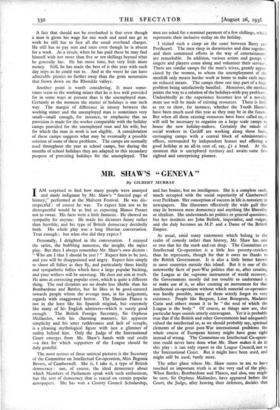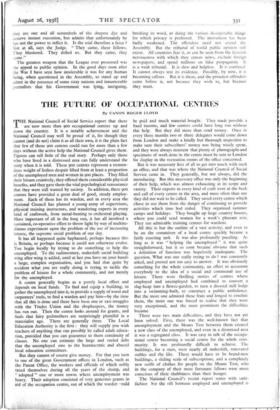MR. SHAW'S " GENEVA "
By GILBERT MURRAY
IAM surprised to find how many people were annoyed and made indignant by Mr. Shaw's " fancied page of history," performed at the Malvern Festival. He was dis- respectful : of course he was. To expect him• not to be disrespectful would be as bad as expecting Blanco Posnet not to swear. His facts were a little fantastic. He showed no sympathy for anyone. He made his dictators funny rather than horrible, and his type of British democracy decidedly both. His whole play was a long Shavian conversation. True enough; but what else did they expect ?
Personally, I delighted in the conversation. I enjoyed the satire, the bubbling nonsense, the insight, the rapier play. But then I always remember Mr. Shaw's own dictum : " Who am I that I should be just ? " Expect him to be just, and you will be disappointed and angry. Expect him simply to shoot all follies as they fly, and particularly those kindly and sympathetic follies which have a large popular backing, and your withers will be =wrung. He does not aim at truth. He aims at correcting popular error, which is quite a different thing. The real dictators are no doubt less likable than his Bombardone and Battler, but he likes to be good-natured towards people whom the average man, in his judgement, regards with exaggerated horror. The Shavian Flanco is not in the least like his Spanish original, but extremely like many of his English admirersr–which is surely good enough. The British Foreign Secretary, Sir Orpheus Midlander, with his charming manners, his apparent simplicity and his utter ruthlessness and lack of scruple, is a pleasing mythological figure with just a glimmer of reality behind him. Only the judge of the International Court emerges from Mr. Shaw's hands with real credit —a fact for which supporters of the League should be duly grateful.
The most serious of these satirical pictures is the Secretary of the Committee on Intellectual Co-operation, Miss Begonia Brown, of Camberwell. She is, I take it, a type of British democracy : not, of course, the ideal democracy about which Members of Parliament speak with such enthusiasm, but the sort of democracy that is reared on certain popular newspapers. She has won a County Council Scholarship, and has brains, but no intelligence. She is a complete snob, much occupied with the social superiority of Camberwell over Peckham. Her conception of success in life is notoriety in newspapers. She illustrates effectively the wide gulf that may lie between mere democracy and anything like liberality or idealism. She understands no politics or general questions, but her instincts are John Bullish, imperialist, and vulgar, and she duly becomes an M.P. and a Dame of the British Empire.
As usual, amid many statements which belong to the realm of comedy rather than history, Mr. Shaw has one or two that hit the mark and cut deep. The Committee on Intellectual Co-operation is a 'little less poverty-stricken than he represents, though for that it owes no thanks to the British Govimment. It is also a little better known in most countries outside this island. But it is one of the noteworthy facts of post-War politics that as, after creating the League as the supreme instrument of world recovery, the Governments mostly did not trouble to understand it or make use of it, so after creating an instrument for that intellectual co-operation without which material co--operation was hardly possible, 'many of them utterly forgot its very existence. People like Bergson, Leon Bourgeois, Madame Curie and others meant it to be " the soul of which the League is the body." Of course, as things now are, that particular hope sounds utterly extravagant. Yet it is probably true that if the British and other Governments had adequately valued the intellectual or, as we should probably say, spiritual elements of the great post-War international problems the whole course of European history might have gone right instead of wrong. The Committee on Intellectual Co-opera- tion could never have done what Mr. Shaw makes it do in this play : it can only report to the League Council, not to the International Court. But it might have been used, and might still be used, lastly more.
The other place where Mr. Shaw seems to me to have touched an important truth is at the very end of the play. When Battler, Bombardone and Flanco, and also, one might be sure, Sir Orpheus Midlander, have appeared before the Couri, the Judge after hearing their defences, decides that they are one and all scoundrels of the deepest dye and Jeserve instant execution, but admits that unfortunately he has not the power to inflict it. Is the trial therefore a farce ? Not at all, says the Judge. " They came, these fellows. They blustered. They defied us. But they came, they ame."
The greatest weapon that the League ever possessed was the appeal to public opinion. In the good days soon after the War I have seen how intolerable it was for any human being, when questioned in the Assembly, to stand up and admit in the presence of some sixty nations and innumerable journalists that his Government was lying, intriguing, breaking its word, or doing the various disreputable things for which privacy is preferred. The instrument has been badly weakened. The offenders need not attend the Assembly. But the tribunal of world public opinion still exists. All countries fear it, as can be seen from the feverish nervousness with which they censor news, exclude foreign newspapers, and spend millions on false propaganda. It is a weak tribunal. It is slow and helpless. It is confused. It cannot always test its evidence. Possibly, by now, it is becoming callous. But it is there, and the proudest offenders come before it, not because they wish to, but because they must.



































 Previous page
Previous page